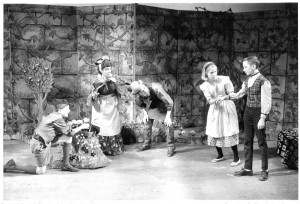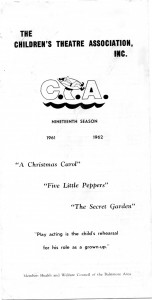Growing Up In Theater
Children’s Theater Association was the brainchild of a woman named Isabel Burger. She was one in a long continuum of creative educators who believed in developing, “the whole child” (meaning that the arts were equally, though not more, important to a kid’s development as the sciences). We were just lucky that she lived in Baltimore.
No one called her Mrs. Burger, at least no one who wasn’t giving her some award for community service. We called her Dearie.
CTA, when we knew it, was in an old carriage house on Ploy Street in downtown Baltimore. Ploy Street is an alley and though it’s still there, as far as I can tell, the carriage house is not.
Old couches and wooden chairs lined the room and an upright piano sat on a faded rug in the middle of the floor. Cheerful, self-possessed adults unlike any I’d ever encountered ran classes with children sitting cross-legged in a circle around them. They improvised scenes and encouraged the kids – even the shyest among them, like me - to play along in their games of pantomime and make believe.
CTA was Howard’s home-away-from home in a meaningful and fundamental way. It gave him a name for this thing he loved and a path from which to pursue it. And it introduced him to others who loved theater as he did. He made friends and he met professionals – actors, directors, teachers -- who were willing to show him the way. It gave him an education so he could learn what he didn’t know. He learned that being talented isn’t just a matter of preening and making your grandmother happy – that other people are talented, too – the trick is to make your talent work, to make something special with it, to share it, and to care.
An old friend of Howard’s and another CTA alumnus told a story at Howard’s memorial. One late evening a flat had to be painted, so a couple of kids volunteered, no doubt grudgingly.
But Dearie said no. “No,” she said, “I want Howard to do it…because only Howard cares enough.”
Whether it was painting the flat or writing a play or singing a song, Howard cared enough – passionately and with his entire  heart.
heart.
Talent is a rare and wonderful thing. But it can only get us so far. It’s the passion that sets a person apart. It’s so easy to say we care about something and so very difficult to really do so. It’s the passion for the flat that made Howard who he was. Sometimes to his detriment, it’s true, sometimes he hurt feelings and sometimes he lost his way but he always cared, passionately, about it all.
He always cared about painting the flat.

